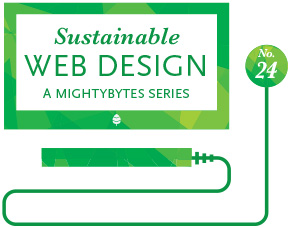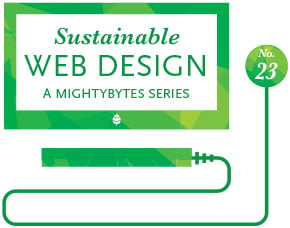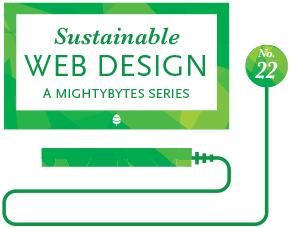5 Ways to Keep Your Site from Getting Hacked

Your website is a safe haven for your content and marketing efforts . . . until it isn’t. In this post, we discuss why keeping web software up-to-date reduces your risk of website hacks and data breaches.
Read More ›
Web Hosting and Renewable Energy

What’s the difference between a web hosting provider that uses renewable energy credits (RECs) and one powered directly by renewable energy? And where do emissions offsets fit into this picture? We explore several answers in this post.
Read More ›
Why Sharing Code is Benevolent and Sustainable

Shared libraries offer quick access to solutions for common development problems. Incorporating shared libraries vetted by the developer community makes your entire codebase easier for other developers to understand and, ultimately, more sustainable. Why do the developers at Mightybyes use shared libraries whenever we can? It might have something to do with our dedication to sustainable web design.
Read More ›
WordPress Security: How to Protect Your Site from Attacks and Hackers

Because of its widespread usage, WordPress sites are popular targets for spammers, hackers, and internet creeps. In this post, we explore WordPress security and offer several ways to protect your website.
Read More ›
How Enabling Caching Speeds Up Your Website

In this post, we explain how to cache website assets using HTTP headers and caching software. Read on to learn how caching can speed up your website.
Read More ›
Disabling Comments to Improve Page Speed

We recently ran a few tests on the Mightybytes website to help speed up load times, and we made an interesting discovery about the impact blog comments have on page speed, user experience, and website sustainability.
Read More ›
Elements of a Great 404 Page

404 is the error code that a server sends when it can't find what a visitor is looking for. In this post, we explore why your 404 page can make or break a visitor's opinion of your brand.
Read More ›
Building Sustainable Development and Deployment Processes

Established workflows are the key to maintaining a sustainable development practice. When developers agree on how to work together, the workflow is sustainable, which ultimately makes our business more sustainable.
Read More ›
How to Streamline Bug Reports

When a newly redesigned website launches, stakeholders are likely to come across elements of the site that aren’t functioning correctly. In order to fix these bugs, as they're called, you’ll need to report them to a developer who can fix them. For a bug to get fixed expediently, it’s helpful to file your report in a way that a developer can easily understand, diagnose, and remedy the problem.
Read More ›
Mobile First Design and Sustainability

Designing for mobile devices first can lead to more user-friendly—and energy efficient—digital products and services. In this post, we explore why mobile first is a potentially more sustainable design approach.
Read More ›



